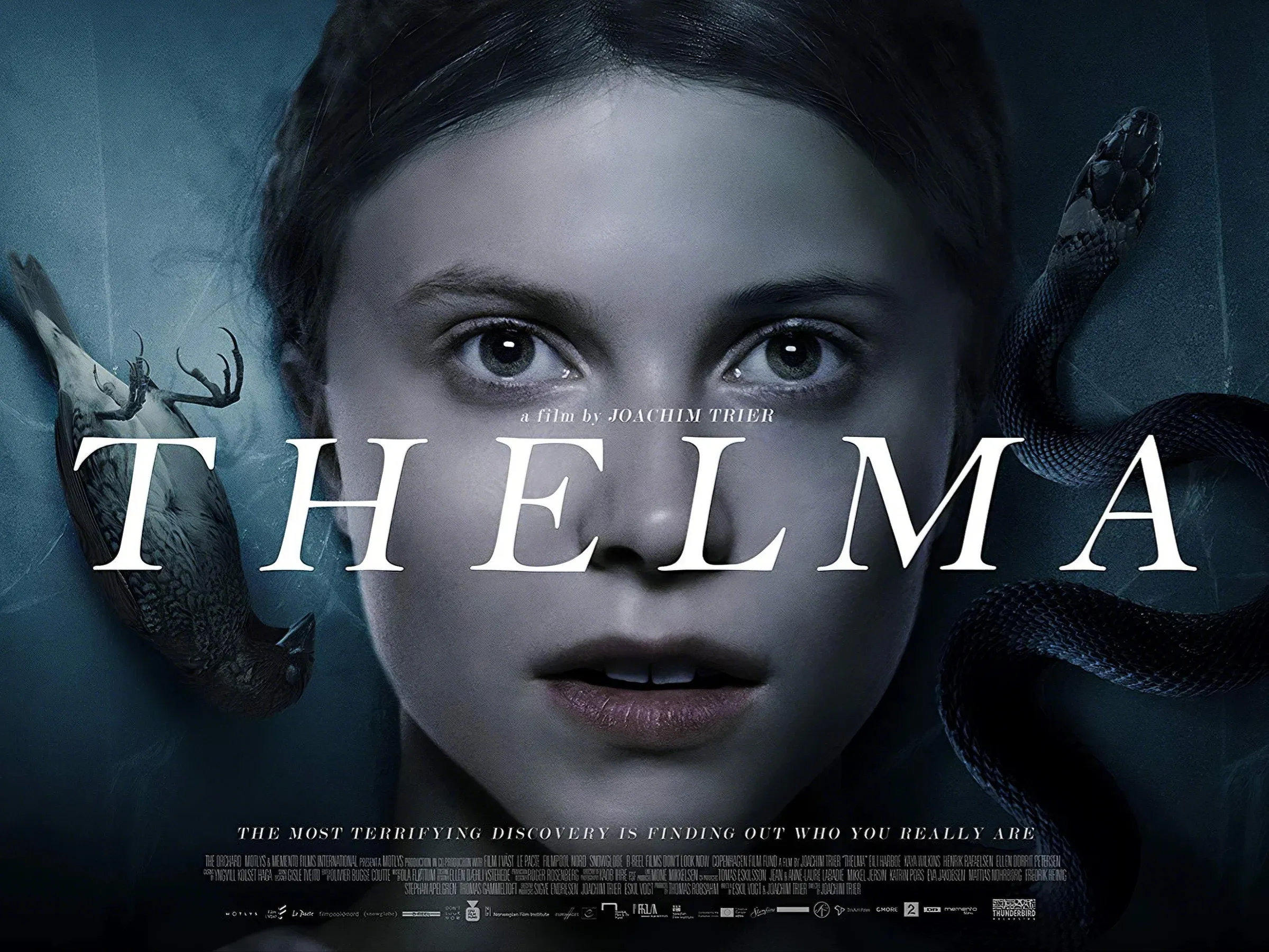Thelma (2017), directed by Joachim Trier, is a Norwegian psychological thriller that seamlessly combines elements of supernatural horror with deeply human themes of identity, repression, and self-discovery. The film follows the life of Thelma, a shy and introverted young woman who has recently moved to Oslo to attend university. Raised in a strict, emotionally distant family with conservative values, Thelma has always felt out of place, especially as she begins to develop feelings for her classmate Anja. As Thelma's emotions intensify, she starts to experience inexplicable supernatural abilities, which she struggles to understand and control. This supernatural awakening is closely tied to her emotional repressions and the traumatic events of her past, which gradually unfold throughout the narrative. The story begins with Thelma's transition from a sheltered upbringing in a small town to the bustling city of Oslo, where she attends university. Despite being away from her strict parents for the first time, Thelma remains emotionally isolated and finds herself struggling with feelings she has never acknowledged before. Her friendship with Anja, a confident and free-spirited classmate, eventually blossoms into a deeper emotional and physical attraction. As Thelma’s feelings for Anja grow stronger, she experiences strange, violent seizures that seem to be triggered by her intense emotions. These seizures are not random, and Thelma begins to suspect that they are somehow linked to her suppressed desires. As her powers become more apparent and uncontrollable, Thelma realizes that her abilities are connected to the emotional and psychological trauma she has been repressing for years. This marks the beginning of a tense and complicated journey as Thelma is forced to come to terms with her own identity.

As the narrative unfolds, Thelma delves deeper into the character’s past, revealing the traumatic events that have shaped her repressive upbringing. Through a series of flashbacks, we learn that Thelma's powers have always existed but were suppressed by her father’s authoritarian control. The psychological strain of her father’s emotionally suffocating behavior played a crucial role in the development of her powers. The pivotal moment in the film occurs when Thelma remembers a deeply repressed memory from her childhood: she accidentally caused the death of her younger brother. This trauma, which she had buried deep within her, is revealed to be the root cause of her supernatural abilities. As Thelma starts to recall the events surrounding her brother's death, she grapples with intense feelings of guilt and shame. The more she faces the reality of her past, the more powerful and uncontrollable her abilities become. These supernatural powers manifest when she is emotionally vulnerable, and they increasingly put both her and those around her in danger. Thelma is caught in a battle between the emotional awakening of her sexuality and the painful memories of her past, as she struggles to make sense of who she truly is.

The film's climax occurs when Thelma is forced to confront her father, who has controlled her life for years. In a final confrontation, Thelma learns the full extent of her father’s manipulation and the harsh truths about her past. Her father's oppressive control, designed to suppress her powers and her emotions, ultimately leads Thelma to a moment of liberation. With the revelation of the past, Thelma’s powers reach a peak, and she learns to embrace them. As she reconciles her emotions and accepts her attraction to Anja, Thelma frees herself from the guilt and shame that have haunted her for so long. She chooses to accept her identity, both as a woman and as someone with extraordinary abilities, rejecting the repression her father imposed on her. The final scenes depict Thelma stepping into a new life, no longer controlled by the past, and embracing her true self. The film ends with an ambiguous yet hopeful note, leaving open the possibility of Thelma’s continued journey toward self-empowerment. In conclusion, Thelma is a haunting, emotionally complex exploration of self-discovery, emotional repression, and the struggles of understanding one's true identity. The film is a powerful blend of psychological thriller and supernatural elements, making it a unique and thought-provoking experience. Through Thelma’s story, the film examines the complexities of human nature—particularly the tension between societal expectations, emotional desires, and the pain of repressed trauma. Trier’s direction, coupled with Eili Harboe's nuanced performance as Thelma, creates a compelling narrative about the transformative power of accepting oneself, even when faced with the most difficult of truths. Ultimately, Thelma is a story about embracing one's true nature, no matter the cost, and the emotional freedom that comes with breaking free from the confines of repression.



-1741829424-q80.webp)
